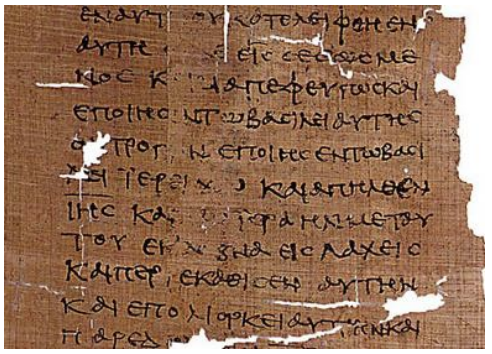The Place of the Septuagint
The Septuagint (also referred to as “The Seventy” or numerically “LXX”) is the term given to the translation of the Hebrew Scriptures into Greek during the 3rd century B.C. The project took decades and was accomplished by several different translators. The project was somewhat controversial (could the words of God be translated? Would they not inevitably suffer a reduction of meaning in translation?), and stories were told of how God Himself helped the translators, so that Jews might read the new Greek version with confidence that it was as inspired as the original. The story goes that seventy-two Jews, six from every tribe,1 were recruited by Ptolemy II in Egypt for the purpose of producing a translation of the Law for use in his library in Alexandria. A later version of the story reports that the translators were sequestered in different rooms throughout the time of their work, and when the final product was examined after seventy-two days, it was found that miraculously everyone had produced an identical translation! This legend was used to promote the new translation as one having divine approval.
The quality of translation within the entire Septuagint project varies considerably. The translation of some biblical books is very literal, while the translation of other books is loose and periphrastic. The lengths of the books differs from the present Hebrew version, sometimes dramatically: the book of Esther has an extra 107 verses, the book of Daniel three entire extra supplements, the book of Job is about one-sixth shorter in length, and the book of Jeremiah is about one-eighth shorter, with the material greatly transposed in order.2 Moreover, the translation of the book of Daniel produced such a garbled text that it was later rejected by the Church and was replaced with a translation by the second century Jewish translator Theodotion.

Since we do not possess the original Hebrew text from which the LXX translators were working, it is difficult to determine how accurate the translation is. Sometimes the current Hebrew text (the so-called “Masoretic” text) represents the original more accurately; sometimes the LXX preserves a more accurate original reading. This is most likely due to the variety of LXX translators.
Sometimes, the LXX version is at variance with citations of the Old Testament by New Testament writers. For example, Matthew’s Gospel cites a prophecy from Hosea 11 thus: “Out of Egypt I called my son,” and interprets this as a prophecy of God calling the Christ child home from Egypt after the flight from Herod (Matt 2:15). In the LXX this Christological reference vanishes, for it reads, “Because Israel was an infant, and I loved him and out of Egypt I called back his children.”
Other LXX translations were clearly motivated by a concern to clean up the Hebrew theologically and not simply to translate it accurately. Thus, for example, in Exodus 3:6 the Hebrew reads, “Moses hid his face, for he was afraid to look at God.”3 The author obviously felt this was theologically problematic, for it seemed to teach that one could see the invisible God. He therefore rendered it, “Moses turned his face away, for he was afraid to look down before God.”
Sometimes the alterations from the Hebrew were dictated by delicacy, and not theology. In the Hebrew version, Proverbs 5:15f dissuades husbands from marital infidelity with the exhortation to “drink water from your own cistern…Let her [i.e., your wife’s] breasts [Hebrew dad] satisfy you at all times; be intoxicated always with her love.”4 This was a bit much for the Septuagint author, so that it became the much tamer and more sanitized, “Drink water from your vessels…Let her be considered your very own and be with you on every occasion, for while indulging in her love you will be increased immeasurably.”
Nonetheless, most of the time when the New Testament writers quote from the Old Testament, they cite the Septuagint text, and the Church used the Septuagint text when it launched out into the Gentile world to preach the Gospel to all nations. It is not hard to see why: at that time, Greek was the international lingua franca, understood by almost everyone. The Church therefore needed a Greek version of the Old Testament Scriptures for its use among the nations, and the Septuagint was ready at hand. In this sense, the Septuagint became the Old Testament of the early Church.
The average person in the Mediterranean world could not read Hebrew, and in fact most Christians of that time reading the Septuagint were unaware of the differences between the Septuagint and the Hebrew, and it is not quite clear they would have cared supremely even if they were aware. Scholars like Origen and Jerome knew of the difference and tried to grapple with it as best they could. It is significant that when Jerome came to produce his own version, he consulted and worked from the Hebrew, calling it “the Hebrew truth” and did not simply work from the Septuagint. The statement therefore that “the Septuagint is the Old Testament of the early Church” is true historically, but not prescriptively. It accurately tells us what the Church did, but not necessarily what we should do now that we have more available resources.
Footnotes
-
The change from seventy-two to seventy in the title “Septuagint” probably reflects a reference to the seventy elders who helped Moses and who received the Holy Spirit to equip them for their task (see Numbers 11). ↩
-
Bruce Metzger, The Bible in Translation (Grand Rapids, MI: Baker Academic, 2001), 17–18. ↩
-
Revised Standard Version (RSV) translation. ↩
-
New American Standard Bible (NASB) translation. ↩